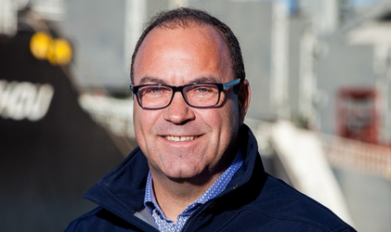A KBRS Partner interviews Kendra MacDonald, who became CEO of Canada’s Ocean Supercluster (OSC) in fall 2018, to gain insights on how high-impact Atlantic Canadian organizations are optimizing the potential of people to contribute to the region’s growth and prosperity, and to discuss how strengthening our workforce can enhance our economic outlook.
As CEO, MacDonald is responsible for leading OSC’s initiatives to build Canada’s ocean economy into one of the country’s most significant and sustainable value-creating economic segments. With more than 20 years of international senior leadership experience in strategy and innovation, most recently as the first Chief Audit Executive for Deloitte Global, MacDonald sees vast opportunities for Atlantic Canada to succeed in what she calls the ‘blue economy.’ She shares her thoughts on how the region’s leaders can gain an advantage in attracting and retaining the necessary talent to become a dominant force in this sector.
Q: You’ve worked extensively in the field of technology. What changes have you noted over the course of your career?
A: There seems to be more focus on how technology and innovation can advance our region’s economy and workforce, which is laying the groundwork for a more entrepreneurial and innovative mindset in Atlantic Canada. You can see the results in the increasing number of startups and incubators across the region, and in initiatives such as Newfoundland and Labrador’s Technology Sector Work Plan, a government-business partnership that is focused on growing the technology industry and stimulating private sector employment. I truly believe we are creating the right conditions for anyone to build a successful technology company in Atlantic Canada, particularly in the ocean sector.
Q: How lucrative is this sector and are there any challenges we need to address to take full advantage of the opportunities it offers?
A: Based on the data we are seeing, the ocean economy is expected to double its growth by 2030, representing a $1.5T global opportunity in the ocean economy. That is being made possible in part by advances in technology – data analytics, internet of things, robotics, autonomous underwater vehicles – which will enable us to explore the ocean further and deeper than ever before and to increase the knowledge we gain from the data we collect.
That potential is what compelled me to join the OSC, because I think Atlantic Canada and Canada overall are well positioned to excel in the ocean economy. We have the world’s longest coastline and the fourth largest ocean territory. Those are significant geographical advantages, but to date we have not capitalized on them to the extent that we could. Our ocean economy contributes approximately 1.5 per cent to Canada’s GDP, which is well below the global average of 3.2 per cent. Clearly, Canada needs to continue to increase its focus on this sector if we want to reap the benefits of this projected growth. The OSC creates the opportunity to strengthen connections between ocean companies across the country and improve the linkages to existing resources within Canadian regional marine clusters.
I think the best approach is to position Canada not just as a leader in innovation but also in commercializing the technologies that we develop. That is how we will become a global force. The challenge is, can we go far enough and fast enough in our thinking to achieve this? Can we forge the necessary collaborations to seize opportunities, or will our companies continue to compete amongst themselves at the regional or national level? Those are the questions that keep me up at night.
Q: Are you optimistic that Atlantic Canadian organizations can work together to succeed on a global scale? What indicators do you see that we are moving in the right direction?
A: I’m very optimistic. I see a growing realization that Atlantic Canada can thrive in the ocean economy and an understanding that no one province has the necessary size or resources to do it alone. There is a real need for us to think, work, and act as one united region if we are going to do this, and you can see that taking hold with initiatives such as the Ocean Frontier Institute, the Atlantic Growth Strategy, and the OSC.
I also see a recognition among Atlantic Canadians that we can lead the nation in determining the vision and building the necessary collaborations to address challenges and succeed internationally. After all, approximately 75 per cent of Canada’s ocean-related economic activity is based in our region, so it makes sense for us to take the initiative and make this happen.
Q: Given the fear factor that is often involved with innovation and related research and technology investments, how do we address any hesitations or reservations so we can move forward?
A: I think the first thing to understand is that these trends are unfolding whether Atlantic Canada participates or not. If we do not commit to be innovators in the ocean sector, we risk being left behind in an increasingly competitive field. So, instead of being afraid of the risk involved in innovation and technological investments, we should be more afraid of the outcomes if we don’t do it.
Secondly, I think there is considerable value in viewing the risk of failure as an opportunity to experiment, learn, and move on, not as something to fear. There is considerable discussion in the tech world about not penalizing innovators for failures in their journeys. That is a major mindset shift for many, if not most, senior leaders, because it means celebrating what you learn from failing just as you celebrate your successes. But such learnings are vital to the next success, so it is a shift that leaders need to make.
Thirdly, we have an aging population in Atlantic Canada. Not only will our businesses have access to fewer people to achieve their productivity and growth goals but also there will be many jobs that younger workers either will not be interested in or will not want to do. Given those demographic shifts, we need to look at automation as a solution that enables us to continue to achieve economic growth with fewer people.
Ultimately, if we want to eliminate the fear of innovation, we need to create work environments that embrace change, and that starts at the executive level. If your leaders are not willing to use new technologies, you cannot expect anyone in your organization to do so, let alone be innovative. When leadership sets the example, everyone is encouraged to follow.
Q: Are there limits to what we can reasonably expect to automate? What distinctions should we draw and how do we prepare people to succeed in such an evolving landscape?
A: I have a 10-year-old and a 15-year-old, so preparing future generations for this evolution is something that preoccupies me. I think there are invaluable intangible qualities such as critical thinking, entrepreneurship, and risk taking that are difficult to replicate with machines – at least for now, and our region should focus on building those qualities in our workforce. We need to foster a mindset of continual learning with an emphasis on self-directed opportunities that go beyond what is offered at academic institutions. There is so much great information out there that is readily accessible, from TED talks, to YouTube, to online learning courses. If we encourage people to seek out these resources, we can help them find their passion, build essential knowledge, and succeed.
Conversely, I see tremendous value in using technology to distill insights from large amounts of data. Machines are typically better at that intensive type of processing than people are, and that is one area where we should focus our automation efforts.
Even with these distinctions, I think we need to recognize that not everyone will be able to retool themselves for an environment where duties are automated. That idea creates a certain degree of discomfort within the workforce, and we are seeing the impacts in terms of how people respond to change and what it means. Leaders will need to invest time and energy to look at how we engage people at risk of displacement due to automation. That said, so far, what I hear from companies across the region suggests that they are mainly using technology to address workforce shortages and enhance performance. Thus, there’s been no significant decrease or displacement of employees to date due to automation in this region in the companies I speak to.
Q: The fact that you haven’t noted much displacement is interesting given that some experts continue to suggest there will be a significant reduction. In light of the wide range of views on automation and its impacts, do you believe the lack of displacement so far suggests there is strong access to different or better jobs in this market?
A: I think that is part of it. We are seeing a significant rise in the number of technology jobs and we hear consistently that it is challenging to fill these roles in Atlantic Canada. Tech jobs are attractive as they generally pay more than the Canadian average and you have significant flexibility in where you work and live. There are jobs available and we are seeing more diversity in the type of positions being offered. However, we also need to consider the impact of an aging workforce on our region as we discussed. Our workforce is going to decrease as a result of changing demographics so we will need to figure out how to do more with access to fewer people and automation is a key part of that.
Even so, efforts to automate back office tasks to enhance productivity, costs, and accuracy will result in job losses. This is where continuous learning comes into play: how do you help employees build new skills? Not everyone will be at an age or stage where they can make that shift, and leaders will need to think about new models to engage those individuals as well.
Q: Given that competition for talent will escalate in the ocean economy, what should Atlantic Canada be doing to attract and retain high-calibre candidates?
A: We need to remember that people are attracted to great opportunities, work environments, technology, and leaders. We need to draw on our strengths – our quality of life and our location, for example – and use that to build great companies. I believe that combination will help differentiate our region and our country from the rest of the world.
Q: Do you see opportunities for Atlantic Canadian organizations to support the creation of a more diverse and inclusive workforce?
A: I do. The growth of the gig economy means there will be fewer people who stay with one employer for life, so companies will be looking at ways to navigate or take advantage of this trend to build teams differently. At the same time, there is a growing recognition that building a diverse workforce offers considerable competitive advantages. But if we want to recruit global talent, Atlantic Canadian organizations will need to rethink their strategies, both globally and locally, to attract the right people and create the right conditions for their success. This is not only dependent on the organization; people need to feel welcome and included in the community where they live and work. We all have a role to play to not only attract but retain talent.
Q: What do you predict will be the defining changes we will see in Atlantic Canada’s workforce over next five to 10 years?
A: The workforce will be more collaborative, which will be incredibly important, but more than that, I believe it will be more entrepreneurial and nimbler, with a commitment to learning and an enhanced ability to adjust to market changes. I also see it more readily embracing technology – not for technology’s sake but to understand how we can solve business issues in a way that accelerates the growth of our companies and our economy.
About Atlantic Leader Insights
Atlantic Canada’s economy is fueled by a diverse array of private and public sector entities that employ thousands of people and contribute to our region’s growth and prosperity. But how are these organizations optimizing the potential of their people, and what insights have they gained about the future of our economy from their innovative initiatives?
KBRS recognizes the critical importance of attracting, developing, and retaining inspiring leaders and top talent within Atlantic Canada. We sat down with leaders at several high-impact Atlantic Canadian organizations to talk about our region’s opportunities and challenges. This article is one in a series that aims to collect these leaders’ insights on how we can enhance our economic outlook by strengthening our workforce.

CEO, Canada’s Ocean Supercluster, 2018 - Present



















